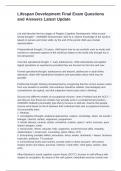Lifespan Development Final Exam Questions
and Answers Latest Update
List and describe the four stages of Piaget's Cognitive Development. What is post-
formal thought? - ANSWER-Sensorimotor: birth to 2, infant's knowledge of the world is
based on senses and motor skills, by the end of the period child uses mental
representation
Preoperational thought: 2-6 years, child learns how to use symbols such as words and
numbers to represent aspects of the world but relates to the world only through his or
her perspective
Concrete operational thought: 7- early adolescence, child understands and applies
logical operations to experiences provided they are focused on the here and now
Formal operational thought: adolescence and beyond, adolescent or adult thinks
abstractly, deals with hypothetical situations and speculates about what may be
possible
Postformal thought: thinking characterized by recognizing that the correct answer varies
from one situation to another, that solutions should be realistic, that ambiguity and
contradictions are typical, and that subjective factors play roles in thinking
Discuss two different models of occupational choices—that of Holland and the SCCT—
and discuss how these two models may actually work in a complementary fashion. -
ANSWER-Holland's personality type theory focuses on skill-set. Asserts that people
choose work based on the fit between their individual traits and occupational interests.
Six personality traits:
1. Realistic
2. Investigative (thought, analytical approaches, explore, knowledge, ideas, not social) =
biologist, chemist, dentist, vegetarian, programmer
3. Artistic (literary, musical, artistic, emotional, creative, open) = artist, musician, poet,
interior designer, writer
4. Social (train, inform, educate, help, supportive, avoid technical skills, empathy,
relationships) = social work, counseling, police officer, LPN
5. Enterprising (verbally skilled, persuasive, direct, leader, dominant) = lawyer, business
executive, politician, TV producer
6. Conventional (rules and routines, provide order or direct structure, self control,
respect power and status, punctual, orderly) = bank teller, clerk typist, cashier, data
entry
Albert Bandura's social cognitive career theory (SCCT): focuses on self-efficacy with
respect to occupation. By means of the self system, individuals exercise control over
, their thoughts, feelings, and actions. Among the beliefs with which an individual
evaluates the control over his/her actions and environment, self-efficacy beliefs are the
most influential predictor of human behavior. The level and strength of self-efficacy will
determine: whether coping behavior will be initiated, how much effort will result, and
how long the effort will be sustained in the face of obstacles. Self efficacy is derived
from 4 most influential sources:
1. Personal performance (Accomplishments - previous successes or failures) - Most
influential
2. Vicarious experience (watching others, modeling, mentoring
3. Verbal persuasion (verbal encouragement or discouragement
4. Physiological and emotional factors (perceptions of stress react
List and describe Erikson's eight stages of Psychosocial Development. - ANSWER-1.
Trust vs. Mistrust (Infancy): When parents consistently respond to the newborns needs,
results in HOPE.
2. Autonomy vs. Shame and Doubt (1-3yrs): Understanding that the child can control
his/her actions counteracts with doubt and shame, results in WILL.
3. Initiative vs. Guilt (3-6yrs): Ones initiative may clash with goals of others, results in
PURPOSE.
4. Industry vs. Inferiority (school age 5-12): Mastery comes from success and
recognition, accepting of the course of ones life, results in COMPETENCY.
5. Ego Identity vs. Role confusion (adolescence): Exploration of different paths to attain
a healthy identity, results in FIDELITY.
6. Intimacy vs. Isolation (young adult 18-40): Form positive, close relationships with
others, results in LOVE.
7. Generativity vs. Stagnation (adulthood 40-65): Caring for others, empathy and
concern, results in CARE.
8. Ego Integrity vs. Despair (Maturity 65): Older adults are trying to make sense of their
lives, results in WISDOM.
Choose two different biological theories of aging and provide a brief description of each.
- ANSWER-1. Programmed theories: biological clock in which cells start to self-destruct.
aging is biologically or genetically programmed and cells start to self-destruct on a
biological clock.
2. Damage or error theories:
a. Wear and tear theory: a theory that suggests that the body (like machine) gradually
deteriorates & finally wears out





